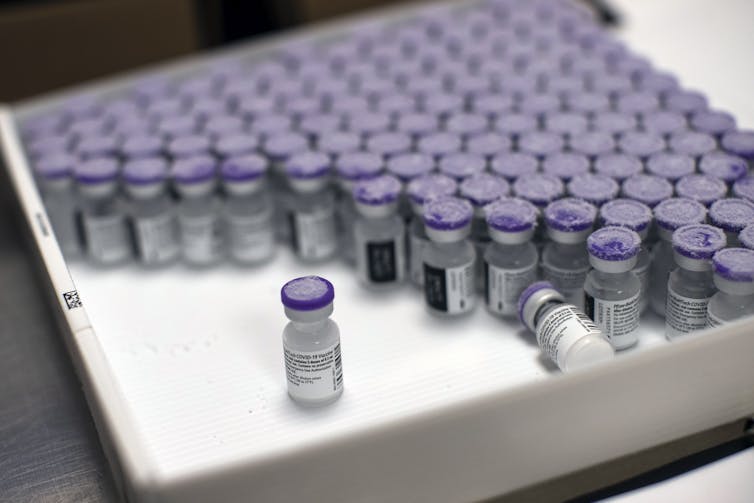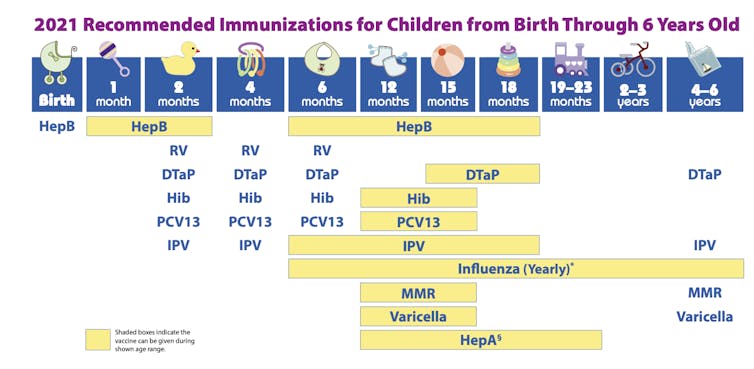from Brian Peppers, University of West Virginia
People are born pretty helpless and still have a lot to develop. And just as you need to learn to walk, so too must your immune system learn to defend itself against infection. Over time, your immune system matures through various stages, much like you progressed from crawling to standing, walking, and running.
This process is one of the reasons why scientists study the immune response to a vaccine in different age groups and why, for example, the COVID-19 vaccines need to be tested separately in children ages 5-11 and 12-16. Doctors want to use the vaccine dose that provides the best protection with the fewest side effects. And that depends on how the immune system works, depending on how developed it is – something you can’t really tell from the outside.
I am an immunologist, and this is how I explain to my pediatric and adult patients how vaccines work in people of all ages.
Two halves of the immune system
The maturation process of the immune system begins shortly after birth.
When you are born, your main immune protection comes from antibodies that your mother distributes through the placenta and breast milk. They offer what is known as passive immunity. Adaptive Immune System of Newborns – the part of your immune system that makes your own antibodies – isn’t really working yet. The process begins immediately, but it can take years for the adaptive immune system to reach full maturity.
Fortunately, you are also born with what is called innate immune system – and lasts a lifetime. It doesn’t have to learn to fight off infection and promote health like the adaptive immune system does. Without the innate immune system, people would get sick much faster and more often.
The innate immune system starts with your skin and mucous membranes. Should germs overcome these physical barriers, they have enzymes that are just waiting to break down foreign organisms. In addition, there are specialized cells that look for anything that is not you to kill intruders, while other cells called phagocytes devour intruders.
So the innate immune system is your body’s first responder. It’ll buy you some time. Then your adaptive immune system comes into play and joins the fight.
When you are immunized by a vaccine or infection, your adaptive immune system begins to actively make its own antibodies. They are proteins that act like suction cups and attach to viruses or bacteria to help the body get rid of the germs faster and prevent the infection from spreading. Antibodies specialize in detecting and eliminating a particular intruder.
The adaptive immune system can learn a new infection or remember an infection it hasn’t seen in a long time.
The dose that is appropriate for adults may not be suitable for adolescents of different ages.
AP Photo / Francisco Seco
Vaccines contribute to immune development
Just as an infant learns to walk, even if you don’t secure the stairs and pool areas for him or her, your immune system can learn to suppress an invading virus without a vaccine – but the risk of injury is much greater.
Vaccines work by triggering the production of antibodies that recognize a particular germ and fight it in a safer way than getting the infection for the first time without it. How well a vaccine works depends on how many antibodies you make in response to how effective they are, and how safe the vaccine is.
As researchers fine-tune the dosage of a vaccine for different age groups, they need to be aware of which parts of the immune system are online and which parts are not fully active at each stage of human development. This is one of the reasons why some vaccines – as for COVID-19 – Get tested and confirmed according to different schedules for adults, teenagers, children and babies.
A number of infant vaccines are given in series – that is, they receive the same type of vaccination several times within a few months. A baby’s adaptive immune system at this age tends to be forgetful or not listening – just as a baby falters when standing and walking. With every exposure, every aspect of the immune system becomes stronger gets stronger and better in warding off would-be infection.
Some vaccines need to be given more than once.
CDC National Center for Immunization and Respiratory Diseases, CC BY
From the age of 4 and through younger adult life, your immune system tends to more responsive and less prone to being forgotten. It is no accident that people tend to do this at this point win most of their allergies. For the COVID-19 Pfizer vaccine, researchers found that children ages 5-11 had a similar immune and safety response a third of the dose used from 12 years.
Scientists start with patients between the ages of 18 and 55 when studying vaccines. Your adult immune system has matured and you can rest assured that you will reliably report all side effects. Seeing what is happening in the adult age group also helps doctors predict what might happen if a vaccine is given to others and to watch out for those side effects in the younger age groups.
[Over 115,000 readers rely on The Conversation’s newsletter to understand the world. Sign up today.]
Around the age of 55, the adaptive immune system becomes weaker and forgetful again, in a way, more like the infant’s developmental system. Fortunately, booster vaccines can provide a quick boost to these elderly patients – such as protecting them from accidental falls after a lifetime of mastering walking and running.
Ultimately, vaccines provide the safest environment for the immune system to learn, and adjusting dosages for different age groups helps ensure that each patient gets exactly what is needed to do their job.![]()
Brian Peppers, Junior Professor for Child and Adult Allergy / Immunology, University of West Virginia
This article is republished by The conversation under a Creative Commons license. read this original article.
.
Thank You For Reading!
Reference: www.healthywomen.org


